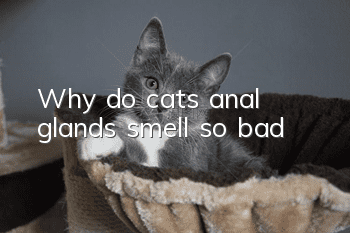Why do cats’ anal glands smell so bad?

Have you ever smelled the smell of a cat’s butt? It’s the smell of fluid secreted by the anal glands. Today let’s talk about the cat’s anal glands.
Where are the anal glands first?
Anal glands are bag-like glands located inside the anal sphincter, approximately at the five o'clock and seven o'clock directions of the anus. By gently touching your fingers inward, you can feel two glands the size of soybeans, located under the skin.
So, what is the function of anal glands?:
Odor markers, recognition between individuals: contain information about the sex and reproductive status of the marker
Assist defecation and lubricate poop: without the protection of anal glands, cats may poop and scratch their chrysanthemums
It has a defensive effect and is secreted when it feels in danger. Of course, some cats will also overflow when they are excited or nervous.
Why does anal gland fluid smell?
Biologists wanted to know exactly which microorganisms produced the smell of feline anal sacs. They took the cat’s anal gland secretions and analyzed the types of microorganisms and compounds in them. They found that the most 83% of the bacteria are Tessaracoccus, a Gram-positive, non-motile, aerobic, cocci-shaped bacterium that lives in soil and in our own intestines.
The second is Bacteroides, a small bacterium that is Gram-negative, non-spore-bearing, and obligately anaerobic. Also known as Bacteroidetes. It normally resides in the intestines, oral cavity, upper respiratory tract and reproductive tract of humans and animals. Next are anaerobic cocci, gastric ulcerative bacteria, and non-coliform bacteria, all of which are found in the intestines and urinary tracts of various mammals. The top six bacteria together account for 98% of all bacteria in secretions.
The researchers also successfully isolated 51 chemicals and odor-producing bacterial samples from anal secretions (a whopping 127 species were found in the secretions alone). Eleven of these compounds are also found in the anal sacs of other mammals.
They are:
Octane-1-ol,
1-(h)-indole,
Nanoic acid,
Pentadecanoic acid,
Toluene,
Trans-2-pentenoic acid,
Non-2-enal,
Tetradecanal,
Palmitic acid,
Stearic acid,
(z)-Doco-13-enoic acid.
Among them, 1-(h)-indole "can be composed of multipleA bacterium with a strong fecal odor that is also found in the anal secretions of red foxes, giant pandas, wolves and ferrets. Maybe it’s these chemicals and bacteria that make cat anal gland fluid smell so bad!
Do the anal glands need to be cleaned?
Generally speaking, anal glands do not need to be cleaned, but if the following points occur, you need to pay attention:
When a cat is obese, excretion may reduce the squeezing effect on the anal glands, leading to accumulation problems
The orifices of the anal glands are dark and dirty, swollen, and even ooze pus-like material
Accompanied by stench
Cats lick frequently
Long-term soft stool or constipation
Cat frequently rubs its buttocks on the ground
Several of the above situations indicate that the anal glands need to be cleaned. Note: If serious conditions such as anal redness, swelling, ulcers, and bloody stools have occurred, please seek medical treatment and do not clean them blindly. This situation requires interventional doctor treatment.
How to clean anal glands
Technique 1: Extrusion method
Why do cats’ anal glands smell so bad?
After keeping the cat in a stable position, put on gloves, place your index finger and thumb on the anal gland (direction of 5 o'clock and 7 o'clock of the anus) across the toilet paper, and push it diagonally inward and upward with a little force until it is excreted completely.
Advantages: Suitable for cats that have been blocked for a long time or even become inflamed, and can be emptied more thoroughly
Disadvantages: The cat struggles seriously, and inexperienced novices often fail to grasp the correct technique, causing secondary damage.
Method 2: Stimulating spray method
Turn the cat over and gently stroke the tendons on both sides of the hind legs. The cat’s anus will be stimulated and contract slightly, and the anal glands will spurt out at this time. Note, it’s better to cover it with a tissue to avoid spraying on your face.
Advantages: Suitable for novices, low difficulty, avoids secondary injuries; Disadvantages: It smells very bad when sprayed on the hair, not suitable for cats with severe blockage that has been blocked for a long time, and may cause failure or incomplete excretion
- Cat vomited half-digested cat food
- What should you do if your cat is sick and refuses to take medicine? Teach you practical techniques for feeding cats medicine!
- How to train a cat not to scratch furniture? Cat training!
- When choosing cat food, don’t just look at the rankings. The best one is suitable for your cat.
- How much weight can a British Shorthair female cat gain?
- Is the master’s ration going to bottom out? | Cat food is not enough, let’s get some cat food!
- Symptoms of kittens choking on milk
- What are the seeds of cat grass?
- Can cats eat dandelion greens?
- Can cats eat grilled gluten skewers?



